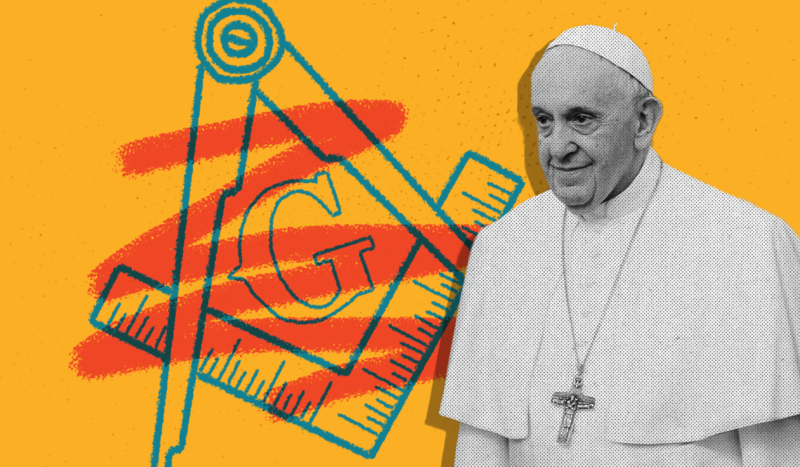
CV NEWS FEED // Catholics are still forbidden from joining the Freemasons, Pope Francis reiterated this week in a letter published by the Dicastery for the Doctrine of the Faith.
Published on November 13, the letter reads, “On the doctrinal level, it should be remembered that active membership in Freemasonry by a member of the faithful is forbidden because of the irreconcilability between Catholic doctrine and Freemasonry.”
The letter cited a 1983 Congregation for the Doctrine of the Faith declaration, which asserted that “The faithful who enroll in Masonic associations are in a state of grave sin and may not receive Holy Communion.”
Freemasonry is a secret society that traces its roots to the Middle Ages in the stonemasons guilds. When memberships were declining, the guilds began accepting non-mason members. Four guilds merged in 1717 in London, England, to form the first official Freemason Lodge. “A strong Anti-Catholicism also permeates Freemasonry,” and the freemasons’ values, oath requirements, and rituals are “inimical to Catholicism,” EWTN explains:
During the initiation rite, the candidate expresses a desire to seek “light,” and he is assured he will receive the light of spiritual instruction that he could not receive in another Church, and that he will gain eternal rest in the “celestial lodge” if he lives and dies according to Masonic principles. Note also that since Masonry involves non-Christians, the use of the name of Jesus is forbidden within the lodge…
The two traditional enemies of Freemasonry are the royalty and the papacy… When one reaches the 30th degree in the masonic hierarchy, called the Kadosh, the person crushes with his foot the papal tiara and the royal crown, and swears to free mankind “from the bondage of despotism and the thraldom of spiritual tyranny.”
The Dicastery published the letter in response to Bishop Julito Cortes of Dumaguete of the Philippines, who had expressed concern about the rising numbers of Catholics in his diocese enrolling in Freemasonry. Cortes requested suggestions on how to respond to the situation.
The letter reads,
Membership in Freemasonry is very significant in the Philippines; it involves not only those who are formally enrolled in Masonic Lodges but, more generally, a large number of sympathizers and associates who are personally convinced that there is no opposition between membership in the Catholic Church and in Masonic Lodges.
The Dicastery took a two-fold approach in the letter to responding to the situation, first by reaffirming the doctrinal teaching that Catholicism is incompatible with Freemasonry, and second by proposing a catechetical approach involving the Catholic Bishops’ Conference of the Philippines.
“On the pastoral level, the Dicastery proposes that the Philippine Bishops conduct catechesis accessible to the people and in all parishes regarding the reasons for the irreconcilability between the Catholic Faith and Freemasonry. Finally, the Philippine Bishops are invited to consider whether they should make a public pronouncement on the matter,” the letter concluded.
Pope Clement XII in 1738 declared that Catholics are forbidden to join the Masons under pain of excommunication. In 1983, the pain of excommunication was lifted, but the Dicastery still affirmed that joining the Freemasons is a mortal sin.
